第14章 II (2)
There was a carpet on the floor, originally of rich texture, but so worn and faded in these latter years that its once brilliant figure had quite vanished into one indistinguishable hue. In the way of furniture, there were two tables: one, constructed with perplexing intricacy and exhibiting as many feet as a centipede;the other, most delicately wrought, with four long and slender legs, so apparently frail that it was almost incredible what a length of time the ancient tea-table had stood upon them. Half a dozen chairs stood about the room, straight and stiff, and so ingeniously contrived for the discomfort of the human person that they were irksome even to sight, and conveyed the ugliest possible idea of the state of society to which they could have been adapted. One exception there was, however, in a very antique elbow-chair, with a high back, carved elaborately in oak, and a roomy depth within its arms, that made up, by its spacious comprehensiveness, for the lack of any of those artistic curves which abound in a modern chair.
As for ornamental articles of furniture, we recollect but two, if such they may be called. One was a map of the Pyncheon territory at the eastward, not engraved, but the handiwork of some skilful old draughtsman, and grotesquely illuminated with pictures of Indians and wild beasts, among which was seen a lion; the natural history of the region being as little known as its geography, which was put down most fantastically awry. The other adornment was the portrait of old Colonel Pyncheon, at two thirds length, representing the stern features of a Puritanic-looking personage, in a skull-cap, with a laced band and a grizzly beard; holding a Bible with one hand, and in the other uplifting an iron sword-hilt. The latter object, being more successfully depicted by the artist, stood out in far greater prominence than the sacred volume. Face to face with this picture, on entering the apartment, Miss Hepzibah Pyncheon came to a pause; regarding it with a singular scowl, a strange contortion of the brow, which, by people who did not know her, would probably have been interpreted as an expression of bitter anger and ill-will. But it was no such thing. She, in fact, felt a reverence for the pictured visage, of which only a far-descended and time-stricken virgin could be susceptible; and this forbidding scowl was the innocent result of her near-sightedness, and an effort so to concentrate her powers of vision as to substitute a firm outline of the object instead of a vague one.
We must linger a moment on this unfortunate expression of poor Hepzibah's brow. Her scowl,--as the world, or such part of it as sometimes caught a transitory glimpse of her at the window, wickedly persisted in calling it,--her scowl had done Miss Hepzibah a very ill office, in establishing her character as an ill-tempered old maid;nor does it appear improbable that, by often gazing at herself in a dim looking-glass, and perpetually encountering her own frown with its ghostly sphere, she had been led to interpret the expression almost as unjustly as the world did. "How miserably cross I look!"she must often have whispered to herself; and ultimately have fancied herself so, by a sense of inevitable doom. But her heart never frowned.
It was naturally tender, sensitive, and full of little tremors and palpitations; all of which weaknesses it retained, while her visage was growing so perversely stern, and even fierce. Nor had Hepzibah ever any hardihood, except what came from the very warmest nook in her affections.
All this time, however, we are loitering faintheartedly on the threshold of our story. In very truth, we have an invincible reluctance to disclose what Miss Hepzibah Pyncheon was about to do.
It has already been observed, that, in the basement story of the gable fronting on the street, an unworthy ancestor, nearly a century ago, had fitted up a shop. Ever since the old gentleman retired from trade, and fell asleep under his coffin-lid, not only the shop-door, but the inner arrangements, had been suffered to remain unchanged; while the dust of ages gathered inch-deep over the shelves and counter, and partly filled an old pair of scales, as if it were of value enough to be weighed. It treasured itself up, too, in the half-open till, where there still lingered a base sixpence, worth neither more nor less than the hereditary pride which had here been put to shame. Such had been the state and condition of the little shop in old Hepzibah's childhood, when she and her brother used to play at hide-and-seek in its forsaken precincts. So it had remained, until within a few days past.